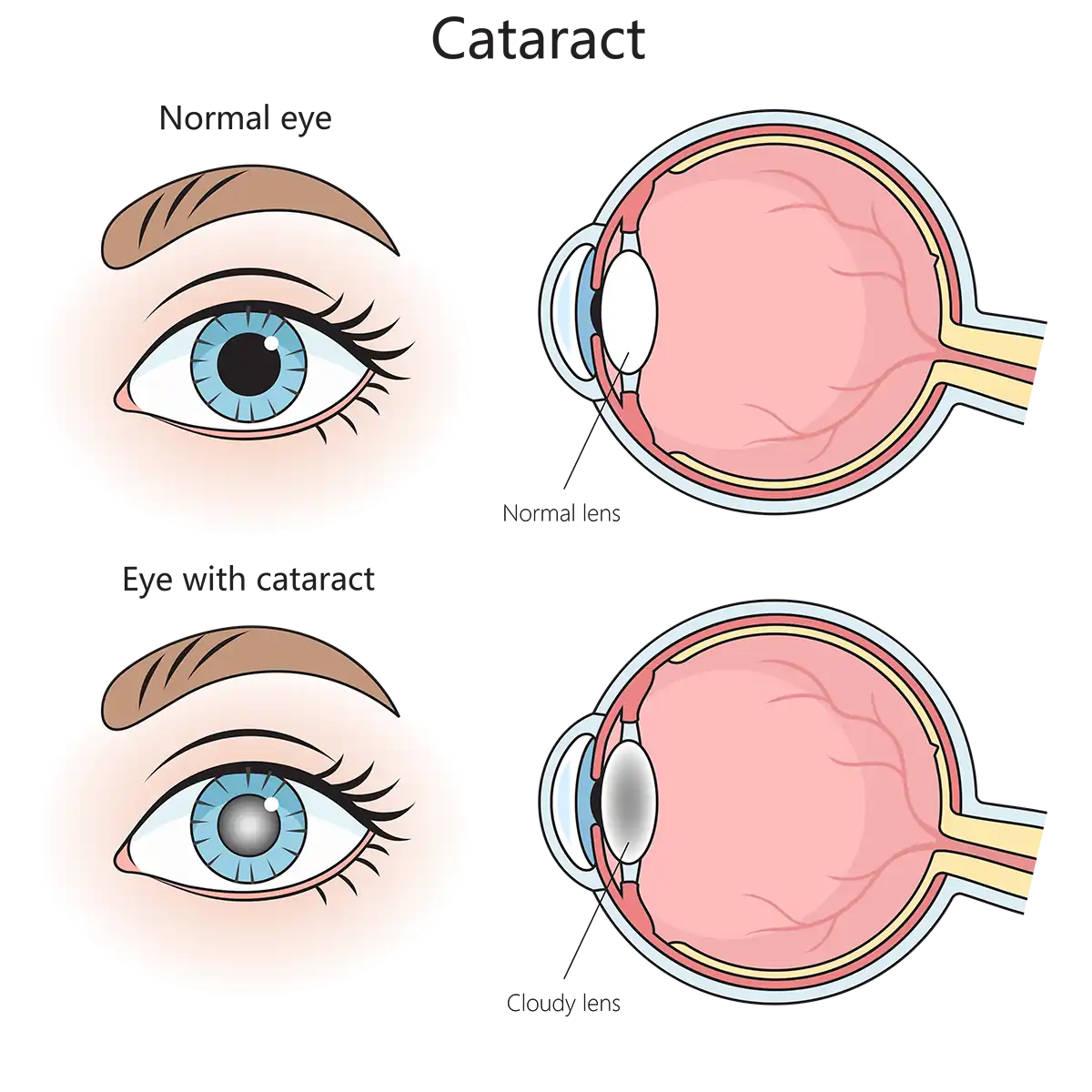
Cataracts
Cataracts can significantly impact your quality of life, making daily tasks like reading, driving, and recognizing faces more challenging due to increasingly blurry or cloudy vision. At Nevada Eye Consultants, our eye doctors offer advanced cataract treatment options to patients in Reno, NV and nearby areas of Northern Nevada and California, using state-of-the-art technology to restore clarity and improve your overall visual experience. Our board-certified ophthalmologists provide a range of personalized solutions, including laser-assisted cataract surgery and premium intraocular lenses (IOLs), to help you see the world more clearly and comfortably.
What are Cataracts?
Cataracts are a condition in which the natural lens of the eye becomes clouded, leading to vision impairment. Normally, the lens is clear, allowing light to pass through and focus accurately on the retina, which helps create sharp and vivid images. However, as we age, the proteins in the lens begin to degrade, forming clumps that create cloudy areas. This process usually begins around the
Trusted Source
Eye Health Statistics
American Academy of Ophthalmology
Go to Source
age of 40,
and over time, the cloudiness can significantly affect one’s vision.
Cataracts are a natural part of the aging process. According to the National Eye Institute, about half of all Americans will develop cataracts by the age of 75, making it one of the most common age-related eye
Trusted Source
Cataract Data and Statistics
National Eye Institute
Go to Source
conditions.
The American Academy of Ophthalmology also reports that more than 20 million individuals over the age of 40 are currently living with cataracts in the United States.
While cataracts can take years to develop, the gradual clouding of the lens eventually impacts daily activities, such as reading, driving, or recognizing faces. Fortunately, cataracts can be treated effectively with cataract surgery, which involves removing the clouded lens and replacing it with a clear artificial intraocular lens (IOL) to restore clear vision.


Symptoms of Cataracts
Cataracts usually develop slowly, and many individuals may not initially recognize the subtle changes in their vision. As the clouding of the lens progresses, symptoms become more noticeable and can significantly impact daily activities. Common symptoms of cataracts include:
- Cloudy or Blurry Vision: A gradual blurring of vision is often the first noticeable symptom, making everything appear less sharp or as though seen through a foggy window.
- Increased Sensitivity to Light and Glare: Bright lights may become uncomfortable, and halos may form around lights, especially at night, causing discomfort during activities like driving.
- Difficulty with Night Vision: Reduced clarity in low-light conditions can make tasks such as driving at night more difficult and hazardous.
- Faded or Dull Colors: Colors may seem less vibrant, appearing faded or acquiring a yellowish tint, making it challenging to differentiate between similar shades.
- Double Vision in One Eye: Double vision, or seeing multiple images, can occur in the affected eye as the lens becomes increasingly clouded.
- Seeing Halos Around Lights: Halos, particularly around car headlights or street lamps at night, are a common complaint as cataracts progress.
- Frequent Prescription Changes: The need to frequently update the prescription for eyeglasses or contact lenses can be a sign of the gradual worsening of
Trusted Source Cataracts Cleveland Clinic Go to Source cataracts.
If you experience any of these symptoms, it is important to visit an eye care professional for a comprehensive eye examination. Early detection and timely treatment can help manage cataracts effectively and preserve your quality of vision.
What Causes Cataracts?
Cataracts primarily form as part of the natural aging process. As we get older, the proteins in the eye’s lens begin to break down, leading to the gradual formation of cloudy areas. This process typically starts in a person’s 40’s or later and progresses over time, ultimately interfering with the ability to see clearly. Although aging is the most common cause of cataracts, there are several other risk factors that can increase the likelihood of developing this condition.
Risk Factors for Cataracts:
- Diabetes: High blood sugar levels can alter the eye’s natural lens, accelerating cataract development.
- Obesity: Excess weight has been linked to a greater risk of cataract formation.
- Smoking: Tobacco use is known to damage cells throughout the body, including those in the eyes, increasing the risk of cataracts.
- Previous Eye Injuries: Trauma to the eye can cause accelerated lens clouding, leading to cataract development earlier than normal.
- Family History: A genetic predisposition can increase the likelihood of cataracts, especially if immediate family members have experienced them.
- Frequent UV Exposure: Long-term exposure to ultraviolet light from the sun without appropriate eye protection can lead to cataract formation.
- Certain Medications: Prolonged use of some medications, such as corticosteroids, can contribute to an increased risk of developing cataracts.
Understanding these risk factors can help individuals make informed lifestyle choices, like protecting the eyes from UV exposure, managing conditions like diabetes, and avoiding smoking, to potentially reduce the risk of cataracts or manage them effectively through early intervention.

Treatment for Cataracts
In the initial stages of cataract development, changes in your glasses or contact lens prescription may help improve your vision temporarily. This can assist with managing symptoms such as blurry or cloudy vision, allowing you to continue with daily activities comfortably. However, this is not a permanent solution, as cataracts will progressively worsen, eventually diminishing the effectiveness of prescription lenses.
The only definitive treatment for cataracts is surgery. Cataract surgery is a highly effective procedure that involves removing the clouded natural lens and replacing it with a clear artificial intraocular lens implant (IOL). This procedure is one of the safest and most commonly performed surgeries worldwide, with a high
Trusted Source
Is Cataract Surgery with Vision-Correcting IOLs Safe?
American Refractive Surgery Council
Go to Source
success rate
for improving vision. For most people, cataract surgery significantly enhances visual clarity, reduces glare, and restores the ability to engage fully in everyday activities.
The timing of cataract surgery depends on how much the cataracts interfere with your quality of life. It is important to consult with your eye care provider to determine when surgery is appropriate based on your symptoms and lifestyle needs.
Cataract Surgery
Cataract surgery is the only effective treatment once cataracts begin to significantly affect your vision. This outpatient procedure involves removing the clouded natural lens and replacing it with a clear artificial intraocular lens implant (IOL), effectively restoring visual clarity. In many cases, this procedure can also reduce or even eliminate the need for corrective eyewear.
As one of the most commonly performed surgeries worldwide, cataract surgery boasts an outstanding success rate of
Trusted Source
Cataract Surgery
American Refractive Surgery Council
Go to Source
over 99%.
Most patients experience substantial improvements in their vision and quality of life, allowing them to resume daily activities without the limitations caused by cataracts. Your eye care provider can help determine the ideal time for surgery based on your unique needs and lifestyle.

Cataract Surgery Options
Depending on your personal preferences, we offer several cataract surgery options that can meet your needs:
Personalized Laser Cataract Surgery
Using the RxSight™ Light Adjustable Lens (LAL), patients can undergo laser cataract surgery with vision optimization following their procedure. This is possible as the Light Delivery Device system sends UV light to adjust the implanted lens, allowing you and your surgeon to refine your final result. Through this process, our surgeons can better customize cataract surgery, providing qualified patients with the best possible vision.
Premium Laser Cataract Surgery
Patients with cataracts who wish to eliminate the need for corrective lenses can benefit from Premium Laser Cataract Surgery. Innovative Trifocal & Extended Depth of Focus (EDOF) IOLs allow for vision correction at both near and far distances (and everywhere in between). For enhanced precision in all of our Custom cataract surgery procedures, we utilize the LenSx™ femtosecond laser in place of a traditional blade during surgery. This, coupled with the use of the ORA™ System for real-time analysis and measurements during Premium Laser Cataract Surgery, allows for unmatched precision.
Custom Laser Cataract Surgery
With Custom Laser Cataract Surgery, patients are able to correct astigmatism and lessen their dependence on glasses or contact lenses. Through advanced technology and testing, as well as state-of-the-art Toric IOLs, we are able to treat cataracts, in addition to addressing refractive errors. Certain patients may also benefit from limbal relaxing incisions (LRIs) to further correct astigmatism. To optimize accuracy in our Custom cataract procedures, we perform surgery using the LenSx™ femtosecond laser, replacing the traditional technique of using a blade. This advanced technology, along with our advanced ORA™ System which performs real-time analysis and measurements, provides our patients with the best possible precision.
Standard Cataract Surgery
Covered (partially or fully) by Medicare and most insurance plans, this procedure replaces the clouded lens with a standard monofocal (single focus) intraocular lens (IOL). This procedure does not address any vision problems beyond the cataracts themselves, so corrective eyewear may still be needed after surgery.

Intraocular Lens Options for Cataract Surgery
During cataract surgery, the natural cloudy lens is replaced with an intraocular lens implant (IOL). Choosing the right IOL can make a significant difference in your vision after surgery, with options ranging from standard to advanced lenses.
Standard IOLs, also known as monofocal IOLs, are covered by insurance and effectively replace the cloudy natural lens and restore vision but do not address other refractive issues, meaning glasses may still be needed for certain tasks. Advanced IOLs, however, offer more comprehensive vision correction by addressing astigmatism, nearsightedness, farsightedness, or age-related near vision loss (presbyopia), allowing many patients to experience reduced dependence on corrective eyewear. Patients who choose advanced IOLs may incur some out-of-pocket costs, but feel the investment in their clear vision is well worthwhile.
Advanced IOL Options
Astigmatism-Correcting IOLs: Toric IOLs correct astigmatism while also enhancing distance vision, helping reduce the need for glasses.
Presbyopia-Correcting IOLs: Multifocal, trifocal, and extended depth of focus (EDOF) lenses provide clear vision at near, intermediate, and distance ranges, helping to reduce reliance on reading glasses.
Light Adjustable Lens™: This advanced lens can be customized after surgery with light treatments, providing a tailored vision correction solution.
Your eye surgeon will help you select the best IOL based on your vision goals and lifestyle, ensuring the optimal outcome from your cataract surgery.
Frequently Asked Questions About Cataracts
Can Cataracts Be Prevented?
Cataracts cannot be completely prevented, but there are ways to promote eye health and potentially delay their development. Wearing UV-protective sunglasses, eating a diet rich in antioxidants, and avoiding smoking can all help maintain healthier eyes. Regular eye exams are also essential for early detection and effective management of cataracts.
How Are Cataracts Diagnosed?
Cataracts are diagnosed during a comprehensive eye exam, which may include a review of your medical history, visual acuity and refraction tests, slit-lamp examination, retina evaluation, eye pressure measurement, and tests for color vision and glare sensitivity. These steps help confirm the presence of cataracts and determine the best treatment options.
When Is Cataract Surgery Necessary?
Cataract surgery becomes necessary when the clouding of the lens interferes with your quality of life. If activities like driving, reading, or recognizing faces become challenging, it’s time to consider surgery. Consulting with an eye care professional will help determine if surgery is the right option for you.
Is Cataract Surgery Painful?
No, cataract surgery should not be painful. Anesthetic eye drops are applied before the procedure to keep you comfortable throughout the process. Patients do not report pain during the surgery or during the recovery period.
What are the risks of cataract surgery?
Cataract surgery is considered one of the safest and most effective procedures performed today, with a complication rate of less than 2%. However, as with any surgery, there are potential risks involved. These include infection, inflammation, halos around lights, and, in rare cases, retinal detachment. Your surgeon will discuss these
Trusted Source
Is Cataract Surgery with Vision-Correcting IOLs Safe?
American Refractive Surgery Council
Go to Source
risks
in detail during your consultation to ensure you are fully informed and comfortable with the procedure.
Can Cataracts Come Back After Surgery?
No, cataracts cannot come back after surgery because the clouded natural lens is removed and replaced with an artificial lens. However, some patients may develop a condition called posterior capsular opacification (PCO), sometimes referred to as a “secondary cataract.” This occurs when the membrane holding the IOL becomes cloudy. PCO can be easily treated with a quick, in-office laser procedure.
Will I Need Glasses After Cataract Surgery?
Whether or not you need glasses after cataract surgery depends on the type of intraocular lens (IOL) used. Standard IOLs restore vision at a single distance, so you may still need glasses for activities like reading. Advanced IOLs, such as multifocal or extended depth of focus lenses, can reduce or eliminate the need for glasses altogether.
Is Cataract Surgery Covered by Insurance?
Yes, cataract surgery is generally covered by insurance, including Medicare, once cataracts begin to significantly impact vision. Coverage usually includes standard IOLs, while advanced IOLs and laser-assisted surgery may involve additional out-of-pocket costs. We will discuss any costs and payment options during your consultation.
Can I Still Get Cataracts After Vision Correction Surgery?
Yes, cataracts can still develop after vision correction procedures like LASIK or PRK, as these procedures do not prevent the natural aging process of the eye. Cataracts are an age-related condition that affects the natural lens, which is not altered by vision correction surgery.
1 National Eye Institute. Cataract Data and Statistics. Available: https://www.nei.nih.gov/learn-about-eye-health/outreach-campaigns-and-resources/eye-health-data-and-statistics/cataract-data-and-statistics. Accessed October 4, 2024.
2 American Academy of Ophthalmology. Eye Health Statistics. Available: https://www.aao.org/newsroom/eye-health-statistics#. Accessed October 4, 2024.
3 Cleveland Clinic. Cataracts. Available: https://my.clevelandclinic.org/health/diseases/8589-cataracts. Accessed October 4, 2024.
4 American Refractive Surgery Council. Is Cataract Surgery with Vision-Correcting IOLs Safe? Available: https://americanrefractivesurgerycouncil.org/refractive-surgery-procedures/cataract-surgery-with-vision-correcting-iols/is-cataract-surgery-with-vision-correcting-iols-safe. Accessed October 4, 2024.
5 American Refractive Surgery Council. Cataract Surgery. Available: https://americanrefractivesurgerycouncil.org/cataract-surgery/. Accessed October 4, 2024.
6 American Refractive Surgery Council. Is Cataract Surgery with Vision-Correcting IOLs Safe? Available: https://americanrefractivesurgerycouncil.org/refractive-surgery-procedures/cataract-surgery-with-vision-correcting-iols/is-cataract-surgery-with-vision-correcting-iols-safe. Accessed October 4, 2024.
The doctors at Nevada Eye Consultants have approved this content.
Page Updated:

